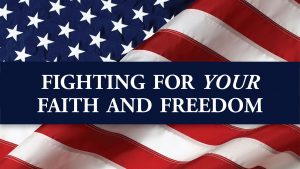 (Washington, D.C.) — On July 19, 2023, the American Freedom Law Center (AFLC) filed a petition for a writ of certiorari in the U.S. Supreme Court in its federal civil rights class action lawsuit against President Biden and Twitter, which alleges that Twitter censored speech critical of the administration’s COVID-19 vaccination policy on behalf of the Biden administration in violation of the First Amendment.
(Washington, D.C.) — On July 19, 2023, the American Freedom Law Center (AFLC) filed a petition for a writ of certiorari in the U.S. Supreme Court in its federal civil rights class action lawsuit against President Biden and Twitter, which alleges that Twitter censored speech critical of the administration’s COVID-19 vaccination policy on behalf of the Biden administration in violation of the First Amendment.
After Dr. Colleen Huber posted a “tweet” on her Twitter account from a well-known Israeli newspaper reporting on findings of mortality rates related to the COVID-19 vaccinations used in Israel, Twitter permanently suspended Dr. Huber, a well-respected and licensed naturopathic medical doctor in Arizona, for purportedly violating Twitter’s COVID-19 Policy.
As the facts set forth in the complaint demonstrate, Twitter was in reality enforcing the Biden administration’s policy to silence anyone critical of COVID-19 vaccinations. Given the recent publication of the Twitter files outlining the White House-Twitter cozy censorship “partnership,” the fact of an illegal conspiracy between the Biden administration and Twitter for Twitter to censor speech critical of the COVID vaccine policies on behalf of the government should surprise no one.
The U.S. District Court for the Northern District of California, sitting in Twitter’s backyard, dismissed (not surprisingly) the lawsuit by ignoring the compelling evidence of a conspiracy between the Biden administration and Twitter.
Contrary to the lower court’s ruling, AFLC’s lawsuit sets forth material facts, which the court was required to accept as true at this stage of the litigation, clearly demonstrating the existence of the Biden/Twitter conspiracy to censor speech critical of the new and experimental COVID vaccinations (including the speech of Dr. Colleen Huber).
AFLC appealed the erroneous ruling to the Ninth Circuit. As is typically the case, the appeal was assigned to a three-judge panel. AFLC’s panel consisted of two Ninth Circuit judges appointed by President Obama and a district court judge appointed by President Clinton sitting by designation.
It should also come as no surprise as to how the panel decided the matter. Treating the case as a mere nuisance, the panel issued a short terse opinion that they designated not to be published in the official reports of federal cases—better to be buried.
The Ninth Circuit rejected AFLC’s petition for rehearing. Thus, the petition to ask SCOTUS to take up the case. As AFLC pointed out in the petition to SCOTUS:
This case presents a constitutional challenge that asks how far may the government go utilizing private actors to censor speech of which the government disapproves. In contemporary times, this question takes on enormous consequences for liberty in general, political freedom in particular, and free speech most particularly. Large social media platforms and their concentration of economic power are relatively new to the law. Their unique ability to control the social and political messaging of public sentiment through hidden algorithms and even outright censorship has become a battleground for those in different and even adversarial political camps.
